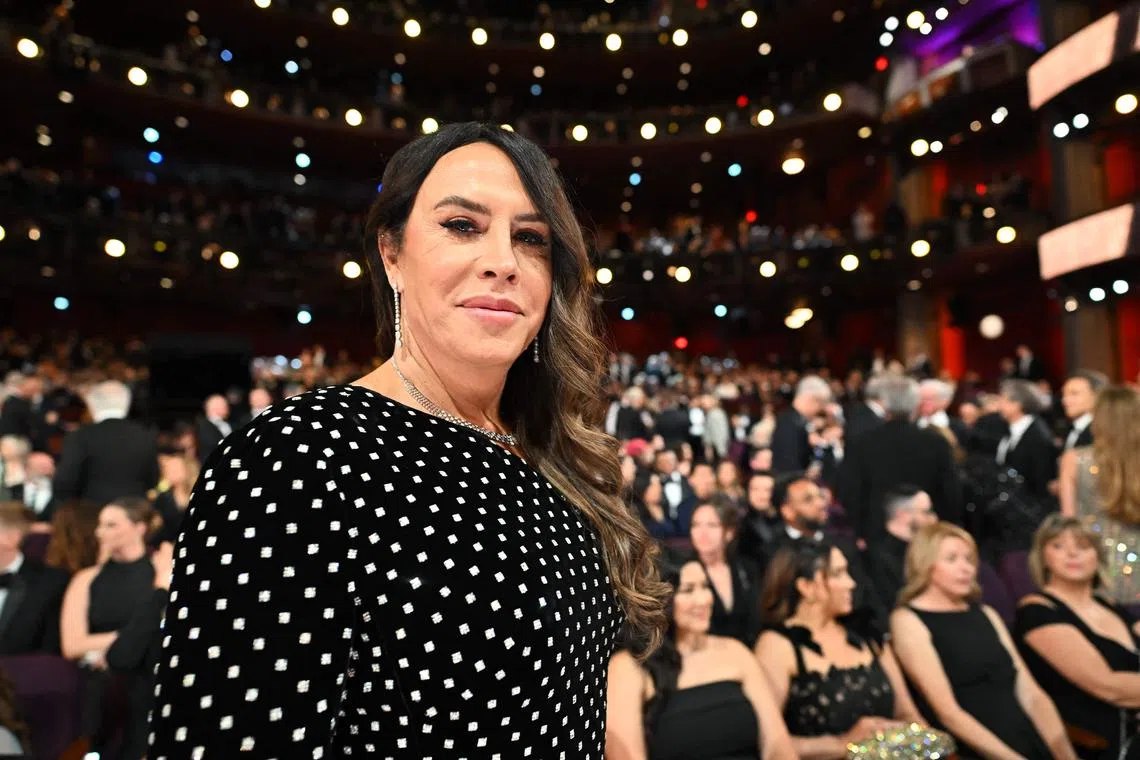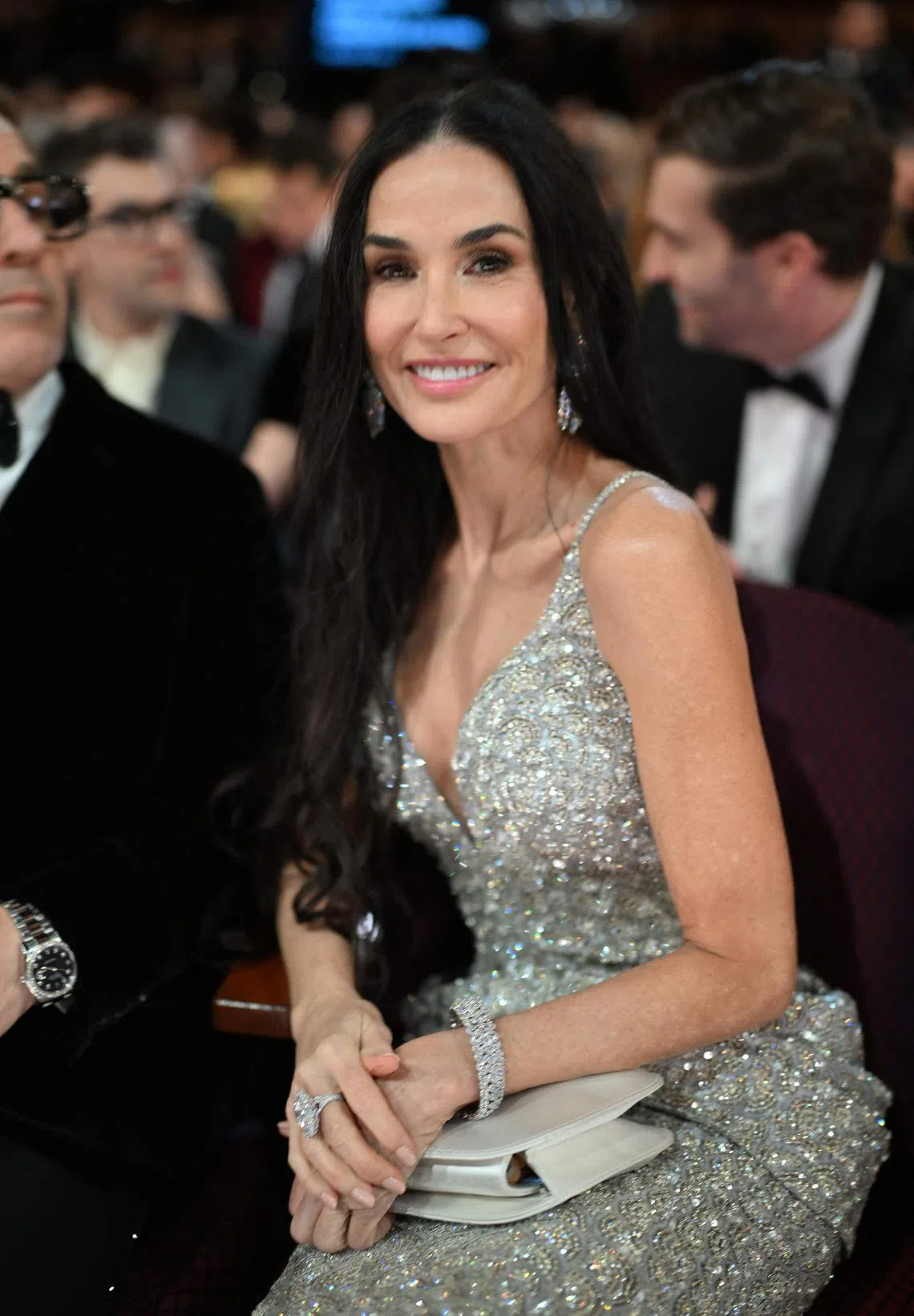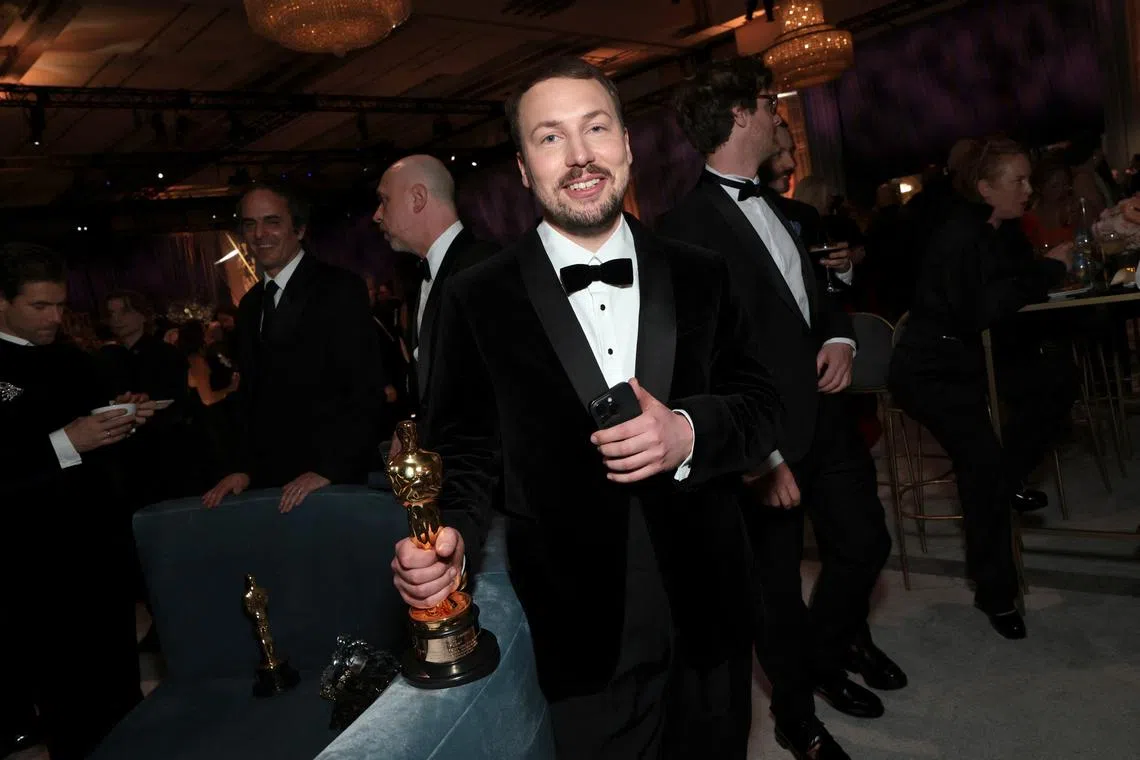Oscars 2025: Indies and outsiders take the spotlight with surprise wins
Sign up now: Get ST's newsletters delivered to your inbox

(From left) Best Actor winner Adrien Brody, Best Actress winner Mikey Madison, Best Supporting Actress winner Zoe Saldana and Best Supporting Actor winner Kieran Culkin.
PHOTO: AFP
SINGAPORE – On Oscar night, it was a time for the underdogs and outsiders to shine.
Anora, the US$6 million (S$8.1 million) indie comedy from independent studio Neon, made for a fraction of the budget of its rivals, was 2025’s biggest winner.
Not only did it triumph in the Best Picture, Best Director (for Sean Baker), Best Original Screenplay and Best Film Editing categories, but its young star Mikey Madison, 25, also took home the Best Actress prize in her first nomination.
Another independent film, the comedy-drama A Real Pain, earned Kieran Culkin his first Best Supporting Actor Oscar.
Flow, created by a tiny team based in Riga, Latvia, beat animation giants Pixar (Inside Out 2) and DreamWorks Animation (The Wild Robot) in the Best Animated Feature category.
The Brutalist, an epic period drama made by indie studio A24, snagged three Oscars – Best Cinematography, Best Original Score and Best Actor for Adrien Brody.
Neon, with its five wins for Anora, and A24, with its three wins for The Brutalist, emerged as the leaders among the studios.
It was not the outcome Oscar pundits saw coming. Earlier in 2025, it seemed like Netflix would be the champ on Oscar night because its crime musical Emilia Perez clinched a leading 13 nominations, the most of any film in the race. Among them was a Best Actress nomination for its star, transgender actress Karla Sofia Gascon.
Many detractors felt the film – which follows a Mexican cartel kingpin (Gascon), who fakes his death to transition into a woman – did not merit the nominations, in large part due to the way it depicts Mexican culture as stereotypically crime-ridden.
More damning though was how Gascon became mired in controversy.
She was accused of racism after toxic social media posts, apparently made by her, surfaced.
Held at the Dolby Theatre in Los Angeles on March 2, the 97th Academy Awards began with first-time host, talk show king and comedian Conan O’Brien poking fun at the controversy in his opening monologue.
“Karla Sofia Gascon is here tonight – and Karla, if you are going to tweet about the Oscars, remember, my name is Jimmy Kimmel,” joked O’Brien, referring to his friend, a talk show veteran and frequent Oscars host.

Spanish transgender actress Karla Sofia Gascon of crime musical Emilia Perez at the 97th Academy Awards on March 2.
PHOTO: AFP
O’Brien also mentioned the high number of F-bombs dropped in Anora, a figure he said matches the number uttered by Gascon’s publicity team after it discovered what she had done.
Going into Oscar night, some speculated that Emilia Perez would set a new record for the film with the most nominations walking away with zero wins. The dramas The Turning Point (1977) and The Color Purple (1985) hold the record, with 11 nominations each.
But Academy voters gave it a break in two categories – Best Original Song for El Mal and Best Supporting Actress for Zoe Saldana.
Her heartfelt, tearful speech was felt by many commentators to be a saving grace in an otherwise distasteful series of events.
The 46-year-old, who portrayed conflicted lawyer Rita Mora Castro, said: “My mum is here. My whole family is here. I am floored by this honour. Thank you to the Academy for recognising the quiet heroism and the power in a woman like Rita. And talking about powerful women – my fellow nominees, the love and community you have offered me is a true gift, and I will pay it forward.”
While Saldana was considered a shoo-in after picking up the best supporting actress Golden Globe, British Academy Film Award and Screen Actors Guild (SAG) Award, Madison’s Best Actress coronation came as a shock.
Hollywood veteran Demi Moore, 62, was expected to get the Oscar in her first nomination. Many felt she deserved it as a reward for decades of work, in the manner of 2023’s feel-good Oscar winners Michelle Yeoh and Ke Huy Quan, but it was not to be.

Hollywood veteran Demi Moore was nominated for Best Actress for horror film The Substance.
PHOTO: AFP
In the horror film The Substance, Moore plays an ageing actress who uses a black-market drug to create a younger version of herself, leading to terrifying consequences.
In Anora, Madison plays the title character, a sex worker who has a tumultuous, short-lived relationship with the son of a Russian oligarch. The film is set in New York’s Russian community and the city’s strip clubs.
In her acceptance speech, the actress thanked family, studios and producers, but used it to “recognise and honour” the sex worker community as well.
“I will continue to support and be an ally. The women whom I’ve had the privilege of meeting from that community have been one of the highlights of this entire incredible experience,” she said.
Madison’s win was even more surprising because just a week ago, Moore bagged best actress at the SAG Awards, a contest that strongly predicts winners at the Oscars.
While Moore’s veteran status went unrecognised, that fate did not happen to Brody.
Many believed his chances at winning Best Actor had been damaged by the use of artificial intelligence in The Brutalist – boosted by his loss of SAG’s best actor to Timothee Chalamet (for Bob Dylan biopic A Complete Unknown).
But Brody, 51, earned his second Best Actor Oscar, adding to the one he collected for the biopic The Pianist (2002).
In The Brutalist, he plays Laszlo Toth, a fictional Hungarian-Jewish architect who flees Europe for the US after World War II.
In his acceptance speech, he spoke of his desire to represent the “lingering traumas” that remain after war, as well as the “oppression, anti-Semitism and racism” that follow conflict.
“I pray for a healthier, happier and more inclusive world, and I believe if the past can teach us anything, it’s a reminder to not let hate go unchecked,” he said.
In accepting his Best Supporting Actor award for A Real Pain, Culkin – known for his entertaining off-the-cuff remarks at awards shows – launched into a funny story about his wife Jazz Charton. She had promised him a fourth child on condition that he win an Oscar.
“I held my hand out, she shook it, and I have not brought it up once until just now. You remember that, honey? Then I just have to say to you, Jazz, love of my life, ye of little faith – no pressure. And let’s get cracking on those kids. What do you say?” joked the 42-year-old.
Culkin and A Real Pain director, writer and star Jesse Eisenberg play ill-matched cousins visiting Poland to honour their grandmother and connect with their roots.
Flow, which follows a cat that journeys across a flooded earth in a boat with other animal companions, was yet another win for a team outside the Hollywood machine.
It was made for US$3.7 million – a paltry sum compared with the US$78 million it cost DreamWorks to make The Wild Robot and the US$200 million Disney/Pixar paid to make Inside Out 2.
The dialogue-free film was also noted for being made with the free software Blender, when larger studios opt to use custom-made tools.
Latvian director Gints Zilbalodis, in accepting the Best Animated Feature Oscar,
“I hope this will open doors to independent animation film-makers around the world. This is the first time a film from Latvia has ever been nominated, so it really means a lot to us. We are very inspired, and we hope to be back soon,” he said.

Latvian director Gints Zilbalodis with his Best Animated Feature Oscar.
PHOTO: AFP
Another film that had to swim against the tide is No Other Land, made by a Palestinian-Israeli collective. It won Best Documentary Feature, a victory that came after it failed to find a distributor in the US, causing its producers to distribute the film themselves.
Anora director Baker summed up the night in which Davids beat the Goliaths of the industry. In accepting Best Picture, he flew the flag for independents.
“I want to thank the Academy for recognising a truly independent film. This film is made of the blood, sweat and tears of incredible indie artists. Long live independent film.”
List of winners
Best Picture: Anora
Best Actress: Mikey Madison – Anora
Best Actor: Adrien Brody – The Brutalist
Best Supporting Actress: Zoe Saldana – Emilia Perez
Best Supporting Actor: Kieran Culkin – A Real Pain
Best Director: Sean Baker – Anora
Best International Feature: I’m Still Here – Brazil
Best Animated Feature: Flow
Best Original Screenplay: Anora – Sean Baker
Best Adapted Screenplay: Conclave – Peter Straughan
Best Original Song: El Mal – Emilia Perez
Best Original Score: The Brutalist
Best Documentary Feature: No Other Land
Best Costume Design: Wicked
Best Production Design: Wicked
Best Sound: Dune: Part Two
Best Film Editing: Anora
Best Cinematography: The Brutalist
Best Visual Effects: Dune: Part Two
Best Live Action Short: I’m Not A Robot
Best Animated Short: In The Shadow Of The Cypress
Best Documentary Short: The Only Girl In The Orchestra



